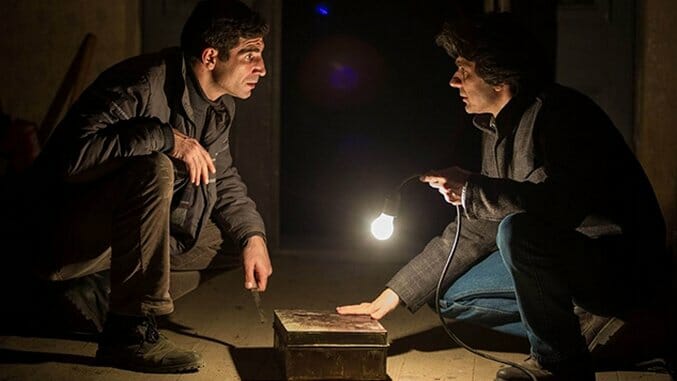The Treasure

On its most superficial level, The Treasure could be seen as a deconstruction of treasure-hunt narratives. There’s no hint of hype or glamor to Costi (Toma Cuzin) and Adrian’s (Adrian Purcarescu) search for buried treasure, there’s just a lot of hard work—hiring a metal detector (person, not device), figuring out logistics and digging. Lots and lots of digging. Plus, in Romania, even if the two do find the loot, they have to go through the police to determine the findings’ “heritage value,” which means the finders only get to keep 30%. Of course, tempers will occasionally flare, as occurs between Adrian and the older metal detector (Corneliu Cozmei) they’ve hired. The sense that in his latest film, Romanian director Corneliu Porumboiu is showing us how a treasure hunt would actually play out in the real world is intensified by both the director’s close focus on process and his use of long takes to induce a feeling of observing events in something like real time.
Both characteristics are consistent with the style he has used in his previous fiction features, including 12:08 East of Bucharest, Police, Adjective and When Evening Falls on Bucharest or Metabolism. But also like these films, The Treasure has a broader social vision underpinning its surface subversion. As ever, Porumboiu is fascinated by the ways Romania’s troubled history continues today to affect the lives of ordinary people. To some extent, that’s the underlying theme of a lot of the Romanian films that have been coming out in the past few years, but instead of the harrowing miserablist journeys chronicled by fellow Romanian New Wave filmmakers like Cristian Mungiu (4 Months, 3 Weeks and 2 Days) and Cristi Puiu (The Death of Mr. Lazarescu), Porumboiu funnels his concerns through deadpan humor and a more humane emphasis on the quotidian. There have been few scenes in recent cinema as incisively hilarious as the climax of Police, Adjective, during which a police officer’s superior uses semantics to whittle away at an officer’s ethical and moral compass. As dryly funny as it is, the scene doubles as a devastating condemnation of the way words can be twisted by authority figures for genuinely dangerous purposes.
In The Treasure, economic anxieties drive Costi and Adrian on their “adventure.” Adrian, Costi’s next-door neighbor, especially needs the money to finally pay off a mortgage he has neglected for three years. But Romania’s past, not just its present, is once again on Porumboiu’s mind. According to Adrian, the treasure they seek is located in a property that was once the home base of the progressive-minded organizers of the short-lived 1848 Wallachian Revolution—a property that Communists seized from Adrian’s family before the family reclaimed it in the 1989 revolution that toppled the dictatorship of Nicolae Ceau?escu. In essence, these two Average Joes are digging through history just for the sake of immediate monetary profit.
-

-

-

-

-

-

-

-

-

-

-

-

-

-

-

-

-

-

-

-

-

-

-

-

-

-

-

-

-

-

-

-

-

-

-

-

-

-

-

-








































